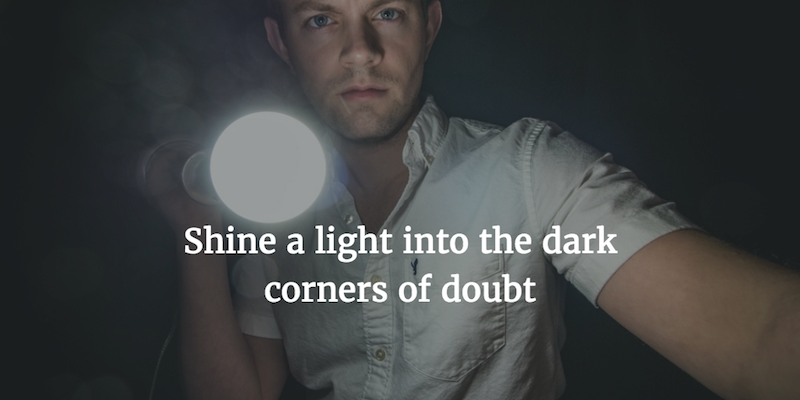One morning last week, I woke up with a crushing sense of doubt about the book I’m about to publish.
The manuscript was with the editor, and I was starting the book launch phase. The first step is sending the book to people I know and trust for their feedback.
This is when fear pushed into the room. What the heck am I doing? Instead of working on the launch, some part of me wanted to hide somewhere with a good book and forget about this crazy project.
This experience got me thinking about fear and its role in the writing process.
When I ask people about their biggest barriers to writing, most respond with issues about focus or time. But one or two have given the deeply honest answer: fear.
Most of us feel fear, or its foot solider doubt, during the writing process.
Fear may be the biggest obstacle to productivity, encouraging us to rationalize procrastination. When we find something more urgent to do besides writing, is it because the other task is more important, or because we are afraid to move forward?
Fear Appears at Critical Junctures
Fear barges in to the writing process when it can do the most damage:
- Before you start writing
- Before you invest the work in revising what you have written
- Before you send the work out into the world – to reviewers, to awards, to people you admire
Fear often appears before you do something meaningful.
When you think about it this way, fear and doubt are a welcome sign. You’re doing something outside of your usual comfort zone.
In my situation, the book launch and publication process gathers so much momentum that once it’s going, fear can’t stop me. So the moment of the advanced review was doubt’s last chance to derail me.
Having now published a few books, I understand that fear is part of the cycle, at least for me. I (almost) welcome its appearance, as it keeps me humble and careful.
Here are the strategies I’ve come up with for handling fear. See if they work for you.
1. Put the Fears and Doubts Into Words
Face the doubts and fear head on. Ask yourself specifically, what am I afraid of? What’s the worst that can happen? Write down those answers.
When I confronted my own doubts and wrote them down, I came up with answers like this:
- The book is no good.
- Who am I to write this book?
- People will think this stuff is obvious.
When you put fears and doubts into words, they become manageable risks instead of terrifying mysteries.
For example, if you are worried about the quality, hire experienced editors. Worried about your qualifications? Take an objective look at why you’re qualified and write a bio that accurately reflects those reasons.
Doubts expressed become manageable risks.
The doubts and fears contain grains of truth. Some people will not like what you write – you must accept that you cannot satisfy everyone.
2. Focus Out, Not In
Shift your focus to the reader. If you are serving the reader, the fear will dissipate.
Fear is a sign that you are focused on yourself, rather than the reader.
Why are you writing and publishing? To make yourself feel good, or to communicate with others?
If you write nonfiction, who is your ideal audience? Why would someone read it? To learn something? To be entertained? Are you passionate about sharing a specific idea?
If fiction is your thing, what are your motivations? Why do people read works like yours? What do you owe to the story, or the reader?
It’s not about you.
3. Act With Bravery
If you have a day of fear and doubt, search out other writers for support and encouragement. (See how “courage” is part of that word?)
Try something else as well: take an action that requires you to ignore the fear.
Fear is an invitation to courage.
For example, on my day of crushing doubt, I sent the book out to several early readers – the exact thing that I did not feel like doing.
Doing this demonstrated to my doubting self that it doesn’t control my actions. I practiced resilience and persistence – perhaps the most important attributes of any writer.
Related Resources
Two Books To Build Your Writing Resilience
Staying Silent or Finding Your Voice
Writing, Courage, and Community

